
Irenaeus was a Greek bishop noted for his role in guiding and expanding Christian communities in the southern regions of present-day France and, more widely, for the development of Christian theology by combating heterodox or Gnostic interpretations of Scripture as heresy and defining proto-orthodoxy. Originating from Smyrna, he had seen and heard the preaching of Polycarp, who in turn was said to have heard John the Evangelist, and thus was the last-known living connection with the Apostles.
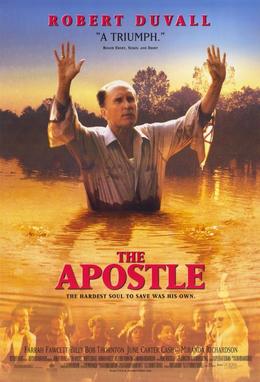
The Apostle is a 1997 American drama film written and directed by Robert Duvall, who stars in the title role. John Beasley, Farrah Fawcett, Walton Goggins, Billy Bob Thornton, June Carter Cash, Miranda Richardson, and Billy Joe Shaver also appear. It was filmed on location in and around Saint Martinville and Des Allemands, Louisiana with some establishing shots done in the Dallas, Texas area. The majority of the film was shot in the Louisiana areas of Sunset and Lafayette.
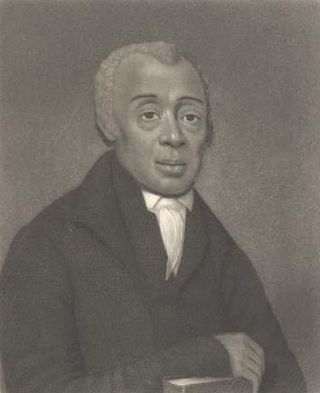
Richard Allen was a minister, educator, writer, and one of the United States' most active and influential black leaders. In 1794, he founded the African Methodist Episcopal Church (AME), the first independent Black denomination in the United States. He opened his first AME church in 1794 in Philadelphia.

Sidney Rigdon was a leader during the early history of the Latter Day Saint movement.

Spiritual warfare is the Christian concept of fighting against the work of preternatural evil forces. It is based on the biblical belief in evil spirits, or demons, that are said to intervene in human affairs in various ways. Although spiritual warfare is a prominent feature of neo-charismatic churches, various other Christian denominations and groups have also adopted practices rooted in the concepts of spiritual warfare, with Christian demonology often playing a key role in these practices and beliefs, or had older traditions of such a concept unrelated to the neo-charismatic movement, such as the exorcistic prayers of the Catholic Church and the various Eastern Orthodox churches.
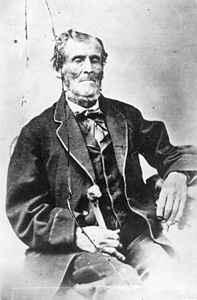
Martin Harris was an early convert to the Latter Day Saint movement who financially guaranteed the first printing of the Book of Mormon and also served as one of Three Witnesses who testified that they had seen the golden plates from which Joseph Smith said the Book of Mormon had been translated.

The Church of Jesus Christ is an international Christian religious denomination headquartered in Monongahela, Pennsylvania, United States. Organized at Green Oak, Pennsylvania, U.S.A. in the year 1862. The church is a Christian Restorationist church and accepts the Book of Mormon as scripture. The church considers itself the gospel restored, or the original church and good news as established by Jesus Christ in the New Testament, restored upon the earth. It also claims to be the spiritual successor to the Church of Christ, organized by Joseph Smith on April 6, 1830. The church sees Sidney Rigdon as Smith's rightful successor following the assassination of Smith because Rigdon was Smith's first counselor in the First Presidency. The church is not officially affiliated with any other church, organization or denomination.
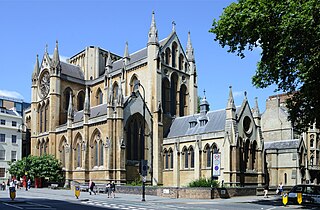
The Catholic Apostolic Church (CAC), also known as the Irvingian Church or Irvingite Church, is a denomination in the Restorationist branch of Christianity. It originated in Scotland around 1831 and later spread to Germany and the United States. The tradition to which the Catholic Apostolic Church belongs is sometimes referred to as Irvingism or the Irvingian movement after Edward Irving (1792–1834), a clergyman of the Church of Scotland credited with organising the movement.
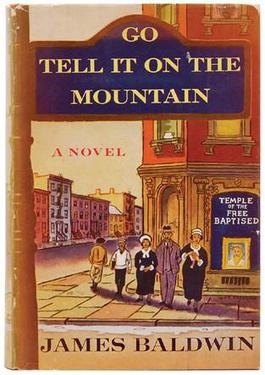
Go Tell It on the Mountain is a 1953 semi-autobiographical novel by James Baldwin. It tells the story of John Grimes, an intelligent teenager in 1930s Harlem, and his relationship with his family and his church. The novel also reveals the back stories of John's mother, his biological father, and his violent, fanatically religious stepfather, Gabriel Grimes. The novel focuses on the role of the Pentecostal Church in the lives of African Americans, both as a negative source of repression and moral hypocrisy and a positive source of inspiration and community. In 1998, the Modern Library ranked Go Tell It on the Mountain 39th on its list of the 100 best English-language novels of the 20th century. Time magazine included the novel on its list of the 100 best English-language novels released from 1923 to 2005.
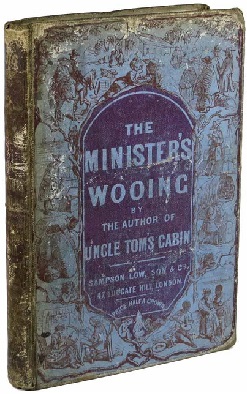
The Minister's Wooing is a historical novel by Harriet Beecher Stowe, first published in 1859. Set in 18th-century New England, the novel explores New England history, highlights the issue of slavery, and critiques the Calvinist theology in which Stowe was raised. Due to similarities in setting, comparisons are often drawn between this work and Nathaniel Hawthorne's The Scarlet Letter (1850). However, in contrast to Hawthorne's The Scarlett Letter, The Minister's Wooing is a "sentimental romance"; its central plot revolves around courtship and marriage. Moreover, Stowe's exploration of the regional history of New England deals primarily with the domestic sphere, the New England response to slavery, and the psychological impact of the Calvinist doctrines of predestination and disinterested benevolence.

The New Apostolic Church (NAC) is a Christian church that split from the Catholic Apostolic Church during an 1863 schism in Hamburg, Germany.
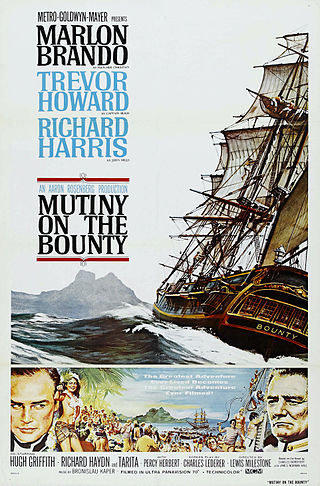
Mutiny on the Bounty is a 1962 American Technicolor epic historical drama film released by Metro-Goldwyn-Mayer, directed by Lewis Milestone and starring Marlon Brando, Trevor Howard, and Richard Harris. The screenplay was written by Charles Lederer, based on the novel Mutiny on the Bounty by Charles Nordhoff and James Norman Hall. Bronisław Kaper composed the score.
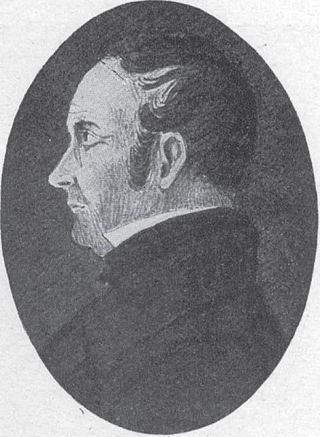
Joseph Fielding was an early leader of the Latter Day Saint movement. He served as the second president of the British Mission (1838–1840), coordinating the activities of missionaries in sections of the United Kingdom and parts of Europe. He was the brother of Mary Fielding, the second wife of Hyrum Smith, and an uncle of Joseph F. Smith, the sixth president of the Church of Jesus Christ of Latter-day Saints.

Yellow Back Radio Broke-Down is a novel by the African-American writer Ishmael Reed. It is a satirical take on the traditional Western. It is Ishmael Reed's second novel, following The Freelance Pallbearers (1967), and was first published in 1969. It tells the story of the Loop Garoo Kid, an African-American cowboy who practices the religion of Neohoodooism, and describes his struggle against established religion and cultural oppression.

The following outline is provided as an overview of and topical guide to Christianity:

In the early 17th century, thousands of English Puritans settled in North America, almost all in New England. Puritans were intensely devout members of the Church of England who believed that the Church of England was insufficiently reformed, retaining too much of its Roman Catholic doctrinal roots, and who therefore opposed royal ecclesiastical policy. Most Puritans were "non-separating Puritans" who believed there should be an established church and did not advocate setting up separate congregations distinct from the Church of England; these were later called Nonconformists. A small minority of Puritans were "separating Puritans" who advocated setting up congregations outside the Church. The Pilgrims were a Separatist group, and they established the Plymouth Colony in 1620. Puritans went chiefly to New England, but small numbers went to other English colonies up and down the Atlantic.

Marlon James is a Jamaican writer. He is the author of five novels: John Crow's Devil (2005), The Book of Night Women (2009), A Brief History of Seven Killings (2014), which won him the 2015 Man Booker Prize, Black Leopard, Red Wolf (2019), and Moon Witch, Spider King (2022). Now living in Minneapolis, Minnesota, in the U.S., James teaches literature at Macalester College in St. Paul, Minnesota. He is also a faculty lecturer at St. Francis College's Low Residency MFA in Creative Writing.

The Book of Night Women is a 2009 novel by Jamaican author Marlon James. The book was first published in hardback on February 19, 2009, by Riverhead Books. The story follows Lilith, a young woman born into slavery, who challenges the boundaries of what is expected of her.

Black Leopard, Red Wolf is a 2019 fantasy novel by Jamaican writer Marlon James. It is the first book of the Dark Star Trilogy. The novel draws on African history and mythology, blended into the landscape of the North Kingdom and the South Kingdom, and the political tensions between these two warring states, as well as various city-states and tribes in the surrounding landscape. The rights to produce a film adaptation were purchased by Michael B. Jordan in February 2019 prior to release of the book.

Gamaliel's principle, also called Gamaliel's rule, Gamaliel's rule-of-thumb, Gamaliel's counsel, Gamaliel's law, or the Gamaliel attitude, is a principle outlined in the Book of Acts in the New Testament by the Rabban Gamaliel. Gamaliel cautions the Jewish Sanhedrin against killing Jesus' disciples, saying that if their ideas were of human origin, they would "come to nought" and the Jews did not need to worry about them; but if they were from God, their ideas would be impossible to overthrow anyway, and if the Jews tried to stop them, they would be fighting against God. Therefore, in Gamaliel's view it would be better to do nothing and let God take care of the situation.




















